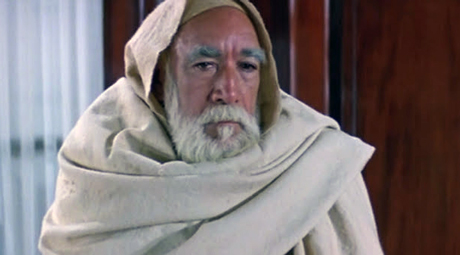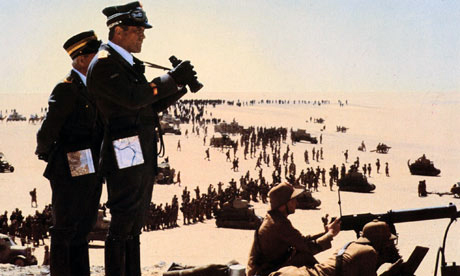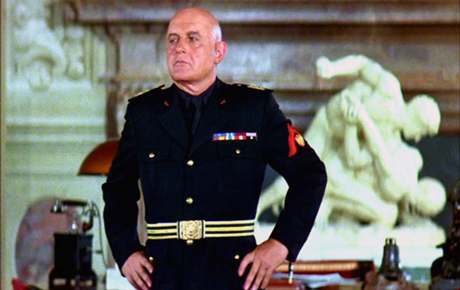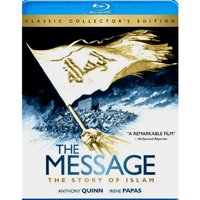Reviewed by Glenn Erickson
Born in Syria, educated in film at USC, producer-director Moustapha Akkad made firm Hollywood connections and eventually got an unlikely feature project going, about the life of Mohammad. When traditional financing fell through Akkad found the needed money through contacts in Saudi Arabia and Libya -- actually, the dictator Muammar al-Gaddafi. Although produced with top English talent, the show ran into unusual exhibition problems. The Arabic language version Al-risalah was banned in some Middle Eastern countries. Just the same, Mohammad, The Messenger of God aka The Message is perhaps the only big-screen film ever made about the founder of Islam.
Then Akkad became the prime investor-producer behind the incredibly successful horror film Halloween and took over the production of the lucrative franchise that followed. His company almost bought a major English studio.
Lion of the Desert came along in 1981. Like the Mohammad films, it was shot in Libya, and financed by the dictator al-Gaddafi. Mounted on a fairly lavish scale, it tells the story of Libya's national hero Omar Mukhtar, a teacher and battle strategist who directed the resistance against Italian occupiers for a full twenty years. The politics in Akkad's paean to a national hero is surprisingly restrained, especially considering that it was bankrolled by the fanatically nationalistic leader of Libya, half a century later.
In the late 1920s, Libya has been in Italian hands for twenty years but refuses to settle into colonial harmony. Sick of his colonial governors' repeated failures to subdue Bedouin resistance, Benito Mussolini (Rod Steiger 1) assigns the ambitious, competent General Rodolfo Graziani (Oliver Reed) to put an end to the warfare. Graziani moves in like a Roman general of ancient times. Like his predecessors he initially underestimates the efficiency of the guerilla tactics employed by rebel commander Omar Mukhtar (Anthony Quinn). The loyalty of Mukhtar's men is almost absolute: they sometimes bind their own legs before taking up position, so that they cannot panic and retreat. Graziani uses his Libyan expert Colonel Diodiece (Raf Vallone) to stall Mukhtar with phony negotiations, while he lands a new, enormous army force. After another defeat, Graziani herds the rural population into terrible concentration camps. He eventually lays several hundred miles of barbed wire down the country's Eastern border, to block arms smuggling from Egypt. A simple, devout teacher, Mukhtar is forced to make terrible sacrifices. Forced onto the defensive, his Bedouin troops are finally surrounded by an overwhelming Italian force.

As a straight historical telling, Lion of the Desert is a solid entertainment, despite drawing its story out to a rather slow 2.5 hours. Salt-of-the Earth ethnic specialist Anthony Quinn played the Prophet's uncle in The Message, and here has white hair and a benign manner befitting a country's George Washington figure. Omar Mukhtar didn't win, but he's earned an enviable reputation among indigenous resisters of colonial aggression. He never sold out to anyone and possessed a dignity that even the Italian Fascists came to respect.
The script is wanting in the surprise department. Omar is an inspiration to small boys and a veritable saint to his people. His faithful soldiers are not fanatics, but committed resistance fighters. Most scenes are not particularly deep: the concentration camp episode is limited to the expected starved corpses loaded onto trucks while mournful women, especially Mabrouka (Irene Papas) suffer. The actress is once again called upon for just a few moments showing Mabrouka being severe and resolute. In one surprising scene, rebel horsemen free a group of women and children being taken to the Camps. But before they can escape, Italian armor arrives. Omar and his fighters have no choice but to abandon their dependents and ride off. Everybody understands Omar's instructions, including Mabrouka: they can't afford the luxury of fighting the Fascists straight on.
Andrew Kier is one of Omar's loyal strong men. All of the fighters ride those magnificent Arabian horses at breakneck speed, even the old men. In a one-scene cameo, John Gielgud plays a rich Libyan who has already sold out to the Italians, and urges Omar to do the same. It helps that Omar's declarations of ethics and resolve are short and sweet, and that Quinn delivers them so well; in other circumstances we might quickly grow weary of Omar. The feeling of reverence extends to the costumes - no matter that he's living in a cave, Mukhtar's white clothing is always clean.
Rod Steiger offers a lively Mussolini devoid of caricature. Steiger raises his voice here and there but never overacts; he shows us the dictator's strutting attitude without making him into a clown. Mussolini comes off as a civilized strong man convinced that his destiny is to re-establish a lost Roman Empire. It's worthy of mention that Italy's conquest of Libya began over ten years before Mussolini came to power. It wasn't just the Fascists that wanted to take over huge pieces of Africa.

This is also a good movie for fans of Oliver Reed, who gets to play Laurence Olivier's role in Spartacus, more or less. Rodolfo Graziani looks like another joker in a fancy uniform until he employs methods tested and proven by the English colonialists. He's only as brutal and ruthless as he needs to be to achieve his aims. Again, the fairly superficial screenplay doesn't probe into the characters' personal lives. All we learn about Graziani is that his ambition is to secure a big place in history.
The film's best-realized sequence is a mountain battle that becomes a strategic duel between the commanders. Graziani's armored cars and troops climb into a narrow pass and are ambushed by hundreds of rebel marksmen. But he's prepared for that, and has artillery waiting to blast the rebel positions. The chosen angles give us a good feeling as to which forces are at a disadvantage at any particular moment. The little tanks and the bridges over the gorge remind us somewhat of For Whom the Bell Tolls. With the Bedouin resistance apparently blasted out of the rocks, Graziani moves forward, only to find that Omar has thought the game through to the next level, and has an additional surprise for him.
The production is mounted on a more than adequate scale. Akkad's camera direction is serviceable, but neither very creative nor distinguished. What we notice most are production values that money can buy. Jack Hildyard's attractive cinematography makes use of glorious sunsets and the frequently impressive scenery. Either a good matte painting is used, or there were still miles of barbed wire somewhere in Libya to serve as Graziani's version of Hadrian's Wall. An entire rotting horse is seen tangled in the massed coils of wire. Helping quite a bit is Maurice Jarre's sweeping music score. Jarre's mood piece in the Concentration Camp pretty much holds the sequence together.
The production appears to have constructed a minimum of ten armored tanks with treads. We see a couple of biplanes but not the air force that was a major part of the Fascist campaigns. Should we assume that the Libyan army was enlisted to play Italian troops? The movie skips over the fact that the Italian colonial government had already put together indigenous army units at this time - some parts of Libya were actively collaborating.
Although not as rough on horses as the Morocco-filmed The Wind and the Lion, Akkad stages his share of hairy horse-falls, and even one shot in which a horse appears to be roughly hit by an armored car. The film is not stunt-happy or exploitative along these lines.

The drawn-out conclusion is wholly reverent to Omar Mukhtar, so don't expect to see or hear discussion of any faults he might have had. The film's best-written and played scenes occur when Omar and General Graziani are finally face to face. The movie ends by telling us what happened to General Graziani, but doesn't explain much more. WW2 of course blew away all Italian hopes of an Imperial rebirth. But after 1931 the Italians successfully subdued Libyan resistance and the region calmed down. The colonists built roads and civil improvements and established modern institutions. A program to allow Libyans to obtain Italian citizenship was going into effect when war began. That's how empires are built - conquest and assimilation.
I'm informed that Italy diplomatically apologized for the colonial conquest just before the Millennium. To celebrate the occasion, and perhaps thumb his nose at his hosts, Muammar al-Gaddafi visited Rome with an aged descendant of Omar Mukhtar. But all the threads of this story seem to have violent ends. The notorious Al-Gaddafi was of course captured and executed by rebels fairly recently. Along with his daughter, producer-director Moustapha Akkad became a victim of an al-Qaeda bomb in Jordan, in 2005.
Anchor Bay / Starz's Blu-ray of Lion of the Desert is a splendid encoding of this attractive (and rather long) historical epic. 2 The image is bright and colorful, with Anthony Quinn and Oliver Reed looking particularly good in close-ups. The Italian uniforms and equipment are unusual, and the Libyan riders on their fine horses make for a strong contrast with Graziani's motorized brigades.

Anchor Bay's presentation has no extras. The actual on-screen title is Omar Mukhtar. The package says that the show has English subs, but they do not come up on my machine. That's hardly conclusive evidence. Can anyone confirm or refute my finding?
Being released by Anchor Bay at the same time is Moustapha Akkad's highly unusual The Message. As religious law says that the Prophet cannot be represented in either image or voice, Mohammad is often just off-screen, and represented by his sword or his camel. When people talk to him they talk to the camera, and no response is heard. It makes for a strange viewing experience. Much of the same production team of Lion of the Desert was involved, with Jack Hildyard on camera and Maurice Jarre handling the music. Moustapha Akkad's script is reverent, but even more drawn out than the Omar Mukhtar story -- the show clocks in at 171 minutes. Anchor Bay's disc is of equal quality.
On a scale of Excellent, Good, Fair, and Poor,
Lion of the Desert Blu-ray rates:
Movie: Good +
Video: Excellent But format altered... see footnote #2 below.
Sound: Excellent
Supplements: none
Deaf and Hearing-impaired Friendly?
N0; Subtitles: English listed, but they won't come up for me.
Packaging: Keep case
Reviewed: October 10, 2013
Footnote:
1. Steiger had already played Il Duce seven years earlier in the excellent Italian movie The Last Days of Mussolini. It's highly recommended.
Return
2. 11.12.13: Both readers Miles Wood and Ian Whittle have corrected me on this -- I didn't realize that Lion of the Desert was originally Panavision, and these transfers have been re-formatted to fill a widescreen TV. Ian also says that the discs are encoded interlaced, not progressive, contrary to the packaging copy. Many apologies, and thanks!
Return

DVD Savant Text © Copyright 2013 Glenn Erickson
See more exclusive reviews on the Savant Main Page.
Reviews on the Savant main site have additional credits information and are often updated and annotated with reader input and graphics.
Also, don't forget the
2011 Savant Wish List.
T'was Ever Thus.
Return to Top of Page
|

